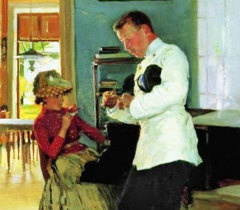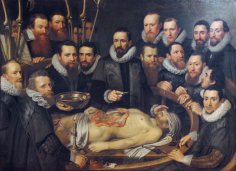
At one time, the romance “He Was a Titular Counselor, She a General's Daughter,” written in 1859 by A.S. Dargomyzhsky to verses by P.I. Weinberg, was incredibly popular among commoners and urban dwellers. The romance, like a mirror, reflected the realities of Russian society in the mid-19th century.
What was so wrong with the general's daughter about the titular councilor? After all, he held a considerable rank; in the army at the time, the equivalent ranks were captain and captain-captain, and in the guards, lieutenant. It would seem a perfectly acceptable match, even for a general's daughter. Her father, too, hadn't earned his stripes right away, but had risen through the ranks of captain. But it's not that simple.
In Russian noble society, all relationships were based on the “Table of Ranks” introduced by Peter the Great. This “Table” placed a captain and a titular councilor, both holding the same rank of 9th class, at different levels in the social hierarchy. It should be noted that this only applies to people who were not hereditary nobles from childhood. The fact is that from the time of Peter the Great, an officer automatically became a hereditary nobleman upon receiving his first rank. A civil servant, even if he had not been born a nobleman, also received it, but only as a personal title. He and his wife were considered noblemen, but their children were not, and received the rather odd status of “chief officer's children,” and from the mid-19th century, honorary citizens.
Naturally, any general would resolutely oppose his daughter's marriage to a personal nobleman with no prospects, since his grandchildren would no longer be nobles but honorary citizens on par with merchants. Who would agree to such a misalliance?
The famous romance was written to address a pressing issue. By the time it was written, relations within the bureaucracy had become even more strained. The year 1845 proved fateful for Russian bureaucracy, with a sharp increase in the requirements for eligibility for nobility based on the rank conferred. Until then, the rank of collegiate assessor, following titular counselor, conferred hereditary nobility. Remember how Famusov, in Griboyedov's “Woe from Wit,” says of Molchalin: “He warmed up a man of humble origins and brought him into my family, gave him the rank of assessor, and took him on as secretary.” Only thanks to this rank could Molchalin have a chance at Sophia's hand.
But let's return to the “titulars,” who had at least some prospects before 1845. From that year onward, titular councilor became the first rank whose holder received personal nobility, making it virtually impossible for an ordinary official to rise to the rank of fourth class (actual state councilor), which conferred hereditary nobility.
Another important event for officials occurred at this time: the conditions for obtaining nobility through the award of an order changed. Previously, receiving any Russian order granted an official the rights of hereditary nobility. Recall Fedotov's painting “The Morning of an Official Receiving His First Cross.” Now, however, this right was granted only by the Order of St. George, St. Vladimir, and the highest degrees of other orders, which officials could not receive. So this option for obtaining nobility was also eliminated.
Pyotr Isaevich Weinberg, the author of the poem that served as the basis for the romance, faced precisely this situation. He was born in 1831 in Nikolaev, the son of a notary. After graduating from Kharkov University, he served in Tambov as a special assignment official for the governor. He received the rank of titular councilor, becoming a personal nobleman, but had no prospect of rising to hereditary nobility. While visiting the governor's house, Weinberg met his daughter, and a love developed that grew into a deep but unrequited feeling. Everything unfolded as was later reflected in the lines of the poem: “He timidly declared his love, but she drove him away.”
Shortly after his unsuccessful matchmaking, Pyotr Isaevich transferred to the capital, where he quickly entered literary circles and began editing the “Literary Chronicle” section of the “Library for Reading.” It was then that he met Dargomyzhsky, to whom he showed his poems and translations. The result was the birth of his famous romance, which quickly became extremely popular.
For the sake of completeness, let's return to the “chief officer's children.” This term didn't mean their fathers were actually officers. The Table of Ranks was simply divided into three arbitrary sections. Ranks from the 14th to the 9th grades were considered chief officer ranks, regardless of whether they were military, civilian, or courtiers. Ranks from the 8th to the 5th grades were considered staff officers, and those from the 4th to the 1st grades were considered general officers' ranks. Therefore, the children of officials in the 14th to the 9th grades were called chief officer's children.
Although not noble, the children of senior officers enjoyed a relatively high social status. They were accepted into noble circles and given preferential treatment when entering the military and educational institutions. In the army, they had the prospect of quickly rising to the rank of officer. They had certain advantages over those from the bourgeoisie or merchant classes at the initial stage of their careers, but nothing more. Incidentally, a girl with such social status could easily marry not only a hereditary nobleman but also a titled one, since in this case she would acquire all the social rights granted to her husband. A young man, however, had even less chance of marrying into hereditary nobility than a personal nobleman. In fact, he had no chance at all. But such were the realities of Russian life.
All that remains for us is to sympathize with the titular councilors of that distant era, whose fate depended on the notorious rank, and to recall the verses of the famous romance.
He was a titular councilor,
She is a general's daughter.
He timidly declared his love,
She drove him away.
The titular councilor has left
And he drank from grief all night –
And in the wine fog she was carried
Before him is the general's daughter…

V.E. Makovsky. Portrait of the composer A.S. Dargomyzhsky

P.I. Weinberg in his old age. By this time, he had become a renowned writer and academician.





